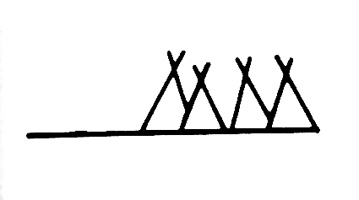









A Cheyenne storyteller smooths the ground in front of her. She draws two lines in the dirt with her right thumb, two with her left and brings both thumbs together to make a mark. The way an old relative would tell. The story is not linear but connected with memories revealed one after another, always coming back together. She will pass on the stories of cultural traditions and histories. She will tell stories about values that are cherished and preserved for coming generations.Some stories show "the correct way for people to treat one another and other creatures in the world." Other stories explain the origin of everything in the world and how that world came into being. A story stays alive in the life of a people because it has a life of its own. If the story is important, it will be remembered. And, if it is not remembered, the people no longer need it. The story has lost its place and is meant to end. All things have their time and then they pass. Stories are told in this way.
The storyteller has "touched the marks on the ground, rubbed both hands together and passed them all over her body." She will tell a story about hearts and hands and lights that pulse and touch and illuminate. When you live in a world "that is not quite right, not really there, sometimes you listen for a voice to direct you." This is the story of Cloud Dancing.
There is a story that I tell about a time long ago when Cloud Dancing played an "emoona namehoto nemeotoz." It was a song of gratitude for the Spirits to celebrate the coming birth of another child. A song that won his wife's heart. When the child died, he plays the song again as a reminder of "what was and may be". Loss and pain, joy and hope. This isn't difficult to understand; if the good times are not mentioned or seen during the bad, it will be as if the good was never there. The Spirits can bring both good and bad. Cloud Dancing understands this and accepts the "reality of life's own finitude." It's an affirmation of life. The child's death was a sad time for us. We talked of waging war against the whites. Black Kettle said, "we had to find our path or we would be a lost people, a people without hope." Cloud Dancing's "emoona namehoto nemeotoz" is heard throughout our camp again. His song is a gift to his wife and to us. Hope is good that way, when it's heard in a clear and strong voice. I think the Spirits were glad that he had remembered them. [Indian Agent]
Ely Parker: "You are Cheyenne."
Cloud Dancing: "I am Cloud Dancing. What tribe are you?"
Ely Parker: "My name is Ha-sa-no-an-da. I am Seneca."
Native peoples often greet each other by asking about the nation or tribe that they are from. It is one of the first questions we ask: "Who are your people?" and "Where are your from?" We have our own name for ourselves and our own language. We can come together. "That isn't to say we did not go to war, but that we also made peace with each other." In Washington, Cloud Dancing meets the great Seneca leader, Ely Parker. He is tall, powerfully built and wears his hair long. Cloud Dancing will ask for the fair treatment of the "manhao"; and to stay where our people have hunted since his grandfather's time.
Every winter we have followed the elk to the south. The Great White Father assigned our people to a reservation on "worthless" lands. Cloud Dancing wants to speak about this; he went to Washington to "speak the truth". The Oglala and Piute have sent men to speak too. Tribes are using cooperation and resistance to survive. Ha-sa-no-an-da and Cloud Dancing have different ways of life, but know that they must find a way to help their people. Ha-sa-no- an-da believes that survival depends on living in the world of whites. Cloud Dancing doesn't think he can change what is coming. He has seen the world of whites and does not "want their civilization." In time, we will see who was right. We may learn that our survival depends on remembering that we can come together. [A Washington Affair]
"There is a trickster who lived among the people. In a way he was an animal, but in another way he was a Cheyenne. He was very clever, but he was always getting into trouble because he thought he was so smart. His name was 'Veho', the same word the Cheyenne use for white men." [John Stands in Timber. The Great American Medicine Show]
We are firm believers in the medicine found in dreams. Men starved in preparation for a vision quest. Then, weakened both physically and mentally by sweatbaths and fatigue, they slipped away alone. Here without food or water, they spent four days and nights. They would listen to the wind, the tree and animals to hear what they had to say in their own language. Exhaustion brought them sleep, or unconsciousness and perhaps a medicine dream. If you were blessed with a vision, an animal or bird appeared to the dreamer, offering counsel and help. Cloud Dancing never talked of the vision he received in the Black Hills. But, it was a strong medicine-dream. He said "his soul had made peace with his son's death." [Rite of Passage. Return Engagement. The Train]
http://www-personal.umich.edu/~jcoles/lsellers.html
Last Updated on Oct. 15, 1997
For problems or comments, send mail to jcoles@umich.edu or PATBALL@DELPHI.COM
©1997 Larry Sellers